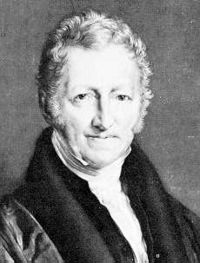
An Essay on the Principle of Population
Parson Thomas Malthus
"If he should succeed in drawing the attention of more able men to what he conceives to be the principal difficulty in the way to the improvement of society and should, in consequence, see this difficulty removed, even in theory, he will gladly retract his present opinions and rejoice in a conviction of his error."
7 June 1798
"pestilence, famine, war, and natural disaster"
The natural law of necessity and scarcity
The scarcity based on an arithmetic progression of food and the geometric progression of human population.
The four great checks on population growth
Historical reflection on the inevitability of restraint.
- Tertullian, four constraints that prune back the potential luxuriance of population.
- Benjamin Franklin, noting the doubling of North America's population every two decades as an upper limit to growth.
- Marquis de Condorcet on the perfectibility of the human intellect & the social condition.
- Malthus' law of population's growth rate as geometric contrasted with the growth rate of food which is arithmetic.
- Jeremy Bentham's felicific calculus of the "greatest good for the greatest number."
Thomas Malthus
The Essay on Population, 1798:
"A man who is born into a world already possessed, if he cannot get subsistence from his parents on whom he has a just demand, and if the society do not want his labour, has no claim of right to the smallest portion of food, and, in fact, has no business to be here he is. At nature's mighty feast there is no vacant cover for him. She tells him to be gone, and will quickly execute her own orders, if he does not work upon the compassion of some of her guests."
(1803) p. 503.
1798 was the first edition of the Malthus' Essay
Chapter One
It has been said that the great question is now at issue, whether man shall henceforth start forwards with accelerated velocity towards illimitable, and hitherto unconceived improvement, or be condemned to a perpetual oscillation between happiness and misery, and after every effort remain still at an immeasurable distance from the wished-for goal.
I think I may fairly make two postulate.
First, That food is necessary to the existence of man.
Secondly, That the passion between the sexes is necessary and will remain nearly in its present state.
These two laws, ever since we have had any knowledge of mankind, appear to have been fixed laws of our nature, and, as we have not hitherto seen any alteration in them, we have no right to conclude that they will ever cease to be what they now are, without an immediate act of power in that Being who first arranged the system of the universe, and for the advantage of his creatures, still executes, according to fixed laws, all its various operations.
I do not know that any writer has supposed that on this earth man will ultimately be able to live without food.
Assuming then my postulate. as granted, I say, that the power of population is indefinitely greater than the power in the earth to produce subsistence for man.
Population, when unchecked, increases in a geometrical ratio. Subsistence increases only in an arithmetical ratio. A slight acquaintance with numbers will shew the immensity of the first power in comparison of the second.
By that law of our nature which makes food necessary to the life of man, the effects of these two unequal powers must be kept equal.
This implies a strong and constantly operating check on population from the difficulty of subsistence. This difficulty must fall somewhere and must necessarily be severely felt by a large portion of mankind.
Through the animal and vegetable kingdoms, nature has scattered the seeds of life abroad with the most profuse and liberal hand. She has been comparatively sparing in the room and the nourishment necessary to rear them. The germs of existence contained in this spot of earth, with ample food, and ample room to expand in, would fill millions of worlds in the course of a few thousand years. Necessity, that imperious all pervading law of nature, restrains them within the prescribed bounds. The race of plants and the race of animals shrink under this great restrictive law. And the race of man cannot, by any efforts of reason, escape from it. Among plants and animals its effects are waste of seed, sickness, and premature death. Among mankind, misery and vice. The former, misery, is an absolutely necessary consequence of it. Vice is a highly probable consequence, and we therefore see it abundantly prevail, but it ought not, perhaps, to be called an absolutely necessary consequence. The ordeal of virtue is to resist all temptation to evil.
This natural inequality of the two powers of population and of production in the earth, and that great law of our nature which must constantly keep their effects equal, form the great difficulty that to me appears insurmountable in the way to the perfectibility of society. All other arguments are of slight and subordinate consideration in comparison of this. I see no way by which man can escape from the weight of this law which pervades all animated nature. No fancied equality, no agrarian regulations in their utmost extent, could remove the pressure of it even for a single century. And it appears, therefore, to be decisive against the possible existence of a society, all the members of which should live in ease, happiness, and comparative leisure; and feel no anxiety about providing the means of subsistence for themselves and families.
